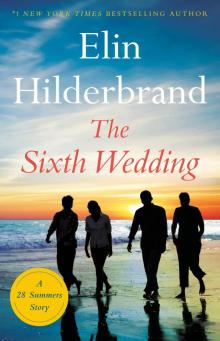- Home
- Elin Hilderbrand
Troubles in Paradise Page 2
Troubles in Paradise Read online
Page 2
Today is a different story.
“Hello?” Lydia says. She’s laughing. Irene hears the whisper of bedsheets and, in the next instant, a deep male voice. This would be Brandon the barista, Lydia’s new boyfriend. Irene doesn’t want to imagine what the two of them are doing up so early.
“Lydia, it’s Irene.” She stops herself. “Good morning.”
“Irene?” Lydia says. “Is everything okay? Did something happen? Something else?”
“Yes,” Irene says.
Lydia is there for Irene no matter what. No matter that it’s five a.m., no matter that it’s negative ten degrees with the wind chill in Iowa City, no matter that Irene interrupted pillow talk. Lydia and Brandon are going to put on their parkas and drive directly over to Church Street to see what’s what. She’ll call Irene when she gets there.
Inside, Irene accepts the three aspirin and a glass of ice water. The Flor de Caña bottle has been tucked away and in its place is a cup of coffee that Irene understands is for her. There are eggs cooking on the stove.
“I don’t want to seem ungrateful, but I just can’t eat,” Irene says.
“The eggs are for Maia,” Huck says.
Right, Irene thinks. Maia has school. For everyone else, it’s a normal day. It’s Thursday.
“We have a charter,” Irene says.
“That we do,” Huck says. “I’m going to take it alone. I thought about passing it off to What a Catch! but it seems like now we could probably use the money. You stay home and figure out what you need to figure out and I’ll be back this afternoon to help you in any way that I can.” He gives her a tentative smile. “Maybe with fresh mahi.”
Irene bows her head. She notices his use of the pronoun we, which she finds both sweet and confusing. What he doesn’t understand is that there is no we. Irene has lost her house here and her home in Iowa City. She feels like Wile E. Coyote in the old cartoons: suspended over a canyon, running on air, and then looking down and realizing there’s nothing beneath him. Irene’s problem can’t be fixed. It can’t be made better by fresh grilled mahi for dinner. Irene’s problem is that her husband of thirty-five years, in addition to keeping a mistress and fathering a child and lying about his whereabouts, had been evading tax laws and laundering money.
“Did I ever tell you that Russ sent me flowers on New Year’s Day?” Irene asks. “Calla lilies, a beautiful bouquet. He must have arranged it with the florist ahead of time and paid extra because of the holiday. And do you know what I thought when I got them? I thought, What a lovely man Russell Steele is. I am so lucky to have him.”
“AC,” Huck says. He turns off the heat under the eggs and takes a step toward her, but she holds up her palm to warn him away.
“He was dead by the time the flowers arrived.”
“Irene,” Huck says. “You’re allowed to be upset.”
Apparently, Irene hasn’t avoided the nervous-breakdown stage after all because what she wants to do is scream, You’re damn right I’m allowed to be upset! It’s a good thing the man is dead because if he were alive, I’d kill him!
But Irene holds her tongue and a second later, Maia walks into the kitchen. She’s wearing pink shorts, a gray T-shirt with a hand-painted iguana on the front, and a pair of black Converse.
When she sees Irene, she does an almost comical double take. “Um…hi? Miss Irene?”
“Good morning, Maia,” Irene says. She turns the corners of her lips up, which physically hurts. Then, as a demonstration that everything’s okay, everything’s fine, she takes a sip of her coffee. It’s strong. One small mercy.
Maia looks from Irene to Huck and back with raised eyebrows. “Did you…stay here last night?”
Irene nearly laughs. She has no idea what to say. Part of her wants to claim she’s here just to pick up Huck for their charter, but in another second, Maia is going to notice Irene’s suitcase open on the coffee table.
“I did,” Irene says. “Huck was kind enough to let me sleep on the sofa.”
“Okay…” Maia says.
Huck spoons some eggs onto a plate and pushes the button on the toaster. “Irene and the boys lost the villa, Nut,” he says. “There’s some…tax trouble.”
Tax trouble is a useful phrase, Irene thinks. It’ll put everyone to sleep.
Maia takes a seat at the table. “So you guys can’t stay there anymore?”
The toaster dings. Huck pulls butter and jam out of the fridge and sets them on the table along with the plate of eggs and toast. “I have to get ready,” he says, and he disappears down the hall, leaving Irene to explain the unexplainable.
“We can’t,” Irene says. Cash called his friend Tilda and spent the night at her house. Irene asked Cash to call Baker and let him know what had happened. Baker was planning on moving down to the island from Houston with his son, Floyd—though these plans will certainly have to change. Hopefully, Baker hasn’t done anything that can’t be undone. “The villa belongs to the government now. Because Russ…your dad…he owed the government money for taxes, and since he’s not here to pay them, the FBI took the house instead.” This isn’t quite true, but it’s close enough.
“So none of us can stay there?”
“No,” Irene says. “They let me leave with only one suitcase. Just my clothes. So the stuff in your room…might be difficult to get back.”
Maia’s fork hovers over her breakfast. She looks so much like Russ’s mother, Milly, in that moment that Irene wants to hug her. Those eyes. Milly’s eyes.
“Are you guys leaving, then?” Maia asks in a wavering voice.
“Oh, Maia,” Irene says, and her eyes fill with tears. “No? I don’t know? The FBI also took my house in Iowa City.”
“They did?”
“They did,” Irene says. She can no longer stand, she’s shaking too badly, so she takes the seat next to Maia. “That house is what’s called a Victorian, and it had been a dream of mine since I was a young girl to restore and live in a real Victorian house. When Russ and I were first married, I kept clippings in a file folder of paint colors I liked, sofas, wallpaper, old sinks, light fixtures, doorknobs.”
“Like Pinterest?” Maia says.
“Yes, like Pinterest,” Irene says. “And once Russ…your dad…took the job down here, I had the money to buy a real Victorian house in a style called Queen Anne, which has elaborate gingerbread fretwork trim…” She looks at Maia. “Do you know what that is?”
Maia shakes her head.
“It looks like a house in a fairy tale, with a deep front porch and a turret and some stained-glass windows.”
“Cool,” Maia says. Irene thinks maybe Maia is indulging her, but it is cool.
“It was as if my entire Pinterest board came to life,” Irene says. “The house is filled with antiques and hand-knotted silk rugs. There are built-in cabinets and salvaged fixtures and stained-glass windows and murals on the walls and chandeliers, and I have a doorbell that used to ring in a convent in Italy.” She needs to stop. What is she doing, unloading all this on a twelve-year-old? “I would have loved for you to see it.” This is true, Irene realizes. She wanted both Huck and Maia to see the Church Street house someday. It was her life’s work. In a way, it was an incarnation of Irene herself. “But they’re taking it. I’m losing my swimming pool and my rose garden with all my heirloom varietals and my two cars. It’ll all be gone. They’re taking it because of Russ. And now I have nothing left.”
Maia stares at Irene and Irene is just sane enough to feel ashamed.
“You have Cash and Baker and Floyd,” Maia says. “You have Huck. He really likes you…he was in a terrible mood when you went back to the States, you know. And you have me.” She picks up her toast, butters and jams it, and holds it out to Irene. “And you have this papaya jam from Jake’s, which is one of the best things I’ve ever eaten. Try it.”
Irene accepts the toast—how can she not?—and takes a small bite. The jam is…well, it’s delicious.
“Good, right?” M
aia says.
Irene nods and takes another small bite.
“You can start a new Pinterest board,” Maia says. “And the first thing on it can be the papaya jam from Jake’s.”
If only it were that easy, Irene thinks. She knows Maia is right; Irene still has what matters. Her family. Her friends. Her health. Her good sense, sort of.
“We aren’t going to leave,” Irene says. She doesn’t add Because we have nowhere to go. This isn’t strictly true, anyway. Baker still owns a house in Houston that is untouched by Russ’s tainted money. And Irene’s elderly aunt Ruth has their family summer home in Door County. But the thought of moving to Houston or living with her eighty-something-year-old aunt isn’t at all appealing. “We’ll figure something out.”
“You can stay here,” Maia says. “And you don’t have to sleep on the couch—we have an extra room. My mom’s room.” She takes a bite of eggs and seems to realize what she has just offered.
“The couch is fine for now,” Irene says quickly. “And I’ll find something. I’m not completely penniless.”
Maia swallows. “Gramps told me I could move into my mom’s room. That means you can have my room.”
“Oh, Maia…”
“It’s a mess, I know,” Maia says. “But I’ll clean it after school. I’m grounded anyway.”
That’s right; Maia is grounded. She’d pulled a disappearing act last night after lying to Cash to get him to drop her off in town. That drama now seems extremely minor, like running out of dinner rolls on the Titanic.
“You don’t have to move on my account,” Irene says, though there is obviously no way she’s going to sleep in Rosie’s room. “The couch is fine.”
“I want to move,” Maia says. “You being here is a good impetus.” She scrunches up her eyes. “Did I use that word correctly?”
Irene can’t help herself; she halfway smiles. “You did.”
“So you’ll stay?”
It’s not in Irene’s nature to accept help from anyone, but she can’t turn down such a sweet offer—besides which, she is the definition of desperate. “I’ll stay until I get back on my feet.”
Suddenly, Huck is before them, dressed in his sky-blue fishing shirt and his visor, a yellow bandanna tied around his neck. “I’m glad that’s settled,” he says.
As Irene is standing at the window watching Huck’s truck wind its way down Jacob’s Ladder, her phone rings. It’s Lydia. Irene hovers her finger over the screen. She would like to stay here, in a space where there’s still a filament of hope. Maybe Agent Kenneth Beckett, who came to search the Church Street house a few weeks earlier, has intervened on Irene’s behalf. There’s always a good FBI agent in the movies, right? One who sees past the letter of the law to what’s authentically right and wrong? Irene didn’t do anything wrong. She doesn’t deserve to lose her home.
“Lydia?” Irene says.
“It’s been seized,” Lydia says. “They have a sign on the door and a team has just arrived to remove the contents. I asked to see the warrant, and what do I know, but it looked official. The guy called the house the ‘fruit of crime.’”
Irene’s stomach lurches and she fears she’s going to vomit. Remove the contents. The “fruit of crime.”
“What about the things that are mine?” Irene asks. “What about the things I bought with my salary from the magazine? What about the things we owned before Russ took the job at Ascension?”
“I don’t know,” Lydia says. “We’re sitting across the street in my car. Should I go ask?”
Irene tries to imagine Lydia asking these complicated questions. But the agents must get asked about this sort of thing constantly, every time they dismantle someone’s life.
“Please ask if you can get one thing,” Irene says. “A photograph of Milly. It’s in the navy-blue guest suite, hanging above the washstand.”
“Photograph of Milly, navy guest room, above the washstand,” Lydia repeats. “I’ll ask right now. You stay on the phone. Here, talk to Brandon.”
No! Irene thinks. She is in no mood to make small talk.
“Hey, Irene,” Brandon says.
“Good morning, Brandon.”
There’s the predictable awkward pause. Brandon clears his throat. “So, this is a bummer, huh?”
A bummer is when Iowa loses to Iowa State. It can maybe be stretched to include a flat tire, a loose filling that results in having to get a root canal, and flunking your driver’s test. What’s happening to Irene is not a bummer. It’s a…well, frankly, she lacks the right word.
“Yes,” she says. “Yes, Brandon, it is.”
Her tone must discourage further conversation because Brandon says, “Hang in there.”
A few moments later, Lydia takes the phone. “Here’s exactly what happened. First, he asked if I was your lawyer. I should have said yes, but I didn’t think fast enough. I told him I was your friend and that all I wanted was one family photograph. I told him I knew where it was and that he could come with me while I retrieved it.”
“What did he say?”
“He said no.”
Irene needs to hang up. She needs to call Ed Sorley, her attorney, although Ed will be in way over his head with this. She needs to find another attorney. But first, Irene wants that photograph. Out of all the items in her home, that’s the one she can’t bear to think of being ignominiously tossed onto a pile in some storage unit. “Thank you, Lydia. I appreciate you getting out of bed to check on this for me.”
“I wish there were more we could do,” Lydia says. “I can’t believe how awful this is…your beautiful house. You worked so hard…remember when they sent the wrong-size pool cover and we thought that was a catastrophe?”
“I have to go, Lydia,” Irene says. “I’ll call you later. Thank you for…I appreciate it.” Irene hangs up, hoping she didn’t sound rude or, if she did sound rude, that Lydia forgives her. Lydia is too nice to handle the FBI agents in Irene’s driveway—but Irene knows someone who isn’t too nice.
She scrolls through her contacts until she finds the number of her former colleague Mavis Key.
Irene barely has to explain; Mavis gets it. The FBI has seized Irene’s property. Mavis doesn’t ask why; she knows about Russ’s second life in the Caribbean, so she can surely guess why. Irene tells Mavis that all she wants from the house is the photograph of Milly, Russ’s mother, taken in 1928 in Erie, Pennsylvania.
“I’m on my way over right now,” Mavis says. “And make no mistake, I will get that photograph.”
For the first time all morning, Irene feels her shoulders relax. Mavis will get the photograph. Mavis is a thirty-one-year-old dynamo who moved to Iowa City from Manhattan, stole Irene’s editor-in-chief job at Heartland Home and Style, and is turning the magazine into a midwestern version of Domino or Architectural Digest, complete with a snappy “social media presence.” The magazine’s publisher, Joseph Feeney, was correct in hiring and immediately promoting Mavis Key, Irene sees now. The woman is effective.
“Thank you,” Irene says.
“Text me your mailing address,” Mavis says. “I’ll have it packaged properly and shipped with insurance.”
“That’s above and beyond—”
“And Irene,” Mavis says, “I want you to call my twin sister. She’s a corporate attorney in New York City, and she deals with white-collar criminals who make Russ look like Mister Rogers.”
Irene very much doubts that. “I didn’t know you had a twin,” she says. Then she realizes she knows next to nothing about Mavis’s personal life.
“Well, I’m warning you, she’s very tough. I find her a bit intimidating, to be honest.”
This gets Irene’s attention. Mavis, with her extreme self-confidence, her stylish clothes, her cutting-edge vision, finds her sister intimidating? What must the woman be like?
“I’m not sure what I need,” Irene says.
“You need Nat,” Mavis says. “Natalie Key. Call her, Irene.”
Baker
&nb
sp; Thursday, four in the morning, Houston, Texas. Baker sits straight up in bed. This is it. This is happening. Their flight to St. Thomas is in a few short hours.
His phone shows two missed calls from Cash the night before plus a text that says, Pick up, bro. It’s urgent.
Baker still has last-minute packing and organizing to do before Ellen comes to take them to the airport. He doesn’t have one spare second to talk to his brother, though he figures Cash must have heard the news: Maia saw Mick kissing Brigid on the beach, Maia told Ayers, and Ayers is going to break off the engagement.
Well, Baker already knows. Ayers texted him right after it happened.
It’s a sign from above; this new chapter in his life is going to work. A tropical island, a nontraditional lifestyle, and, most important, Baker’s relationship with Ayers Wilson. He’s going to win Ayers over or die trying.
“We’re going to miss you like crazy,” Ellen says. They’re curbside at the airport, which is congested with Ubers and taxis and people wheeling their roller bags while talking on their phones, but Ellen insists on getting out so she can give Baker a proper hug goodbye. “Becky is in charge of finding us a new school husband.”
“What?” Baker’s friendship with his school wives is rare and, he thought, special. He never dreamed he’d be replaced.
Ellen shrugs. “She’s the one in HR.”
“Just as long as it’s not Tony,” Baker says.
Ellen grins but her eyes are shining with tears. “I’m only kidding, Bake,” she says. “You know what? We’re already planning a trip to visit you this summer.”
“You are?”
“I’m terrible with surprises,” Ellen says. “Sorry about that. Yes, we’ll see you in a few months.”
“You can stay at the villa, you know,” Baker says. “It has nine bedrooms.”
“You’re sweet to offer, but we wouldn’t do that to your mom and brother,” Ellen says. “I’m going to book rooms at Caneel.”
Baker finds himself getting choked up as he shepherds Floyd into the terminal. His school wives are the only people in Houston he’s going to miss, and he’s touched that they feel the same way, so much so that they’re already planning a trip down. Once they see St. John and Irene’s villa and meet Ayers, they’ll understand why he’s making the move. He’d be a fool not to.

 What Happens in Paradise
What Happens in Paradise Reunion Beach
Reunion Beach The Sixth Wedding
The Sixth Wedding 28 Summers
28 Summers Summer of '79: A Summer of '69 Story
Summer of '79: A Summer of '69 Story Troubles in Paradise
Troubles in Paradise The Perfect Couple
The Perfect Couple Winter Solstice
Winter Solstice Barefoot: A Novel
Barefoot: A Novel